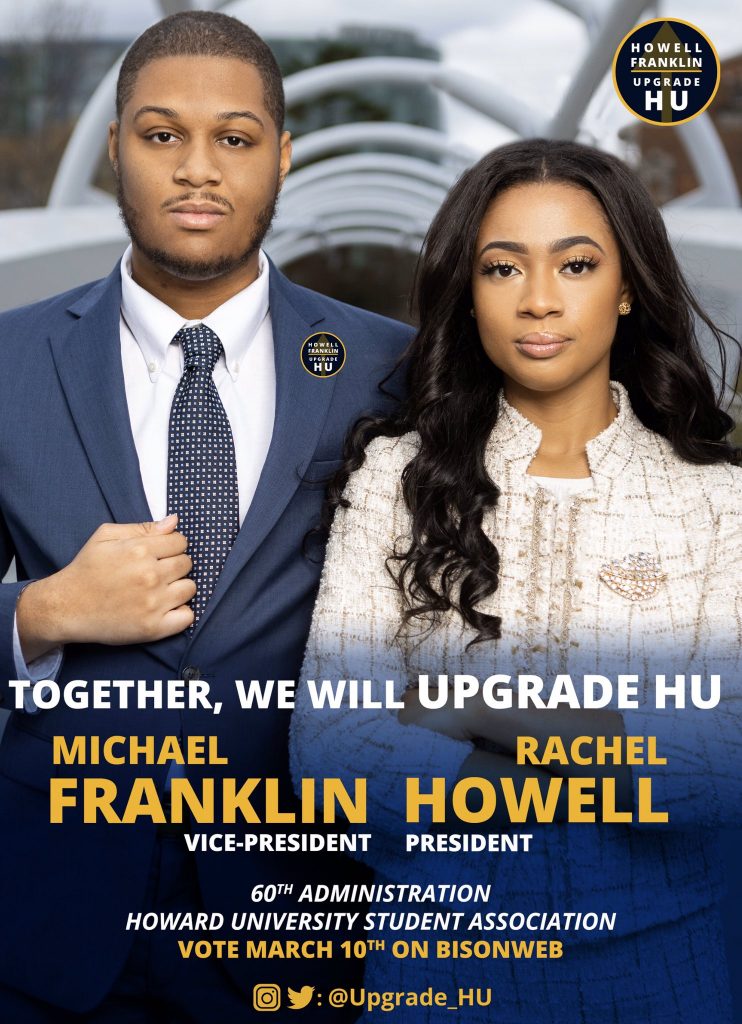By DeShawn Carter, Staff Reporter

Social media and Zoom are now two essential campaign tools for Howard students participating in the upcoming spring elections. Students pursuing a leadership role this year find themselves navigating a completely virtual environment.
For the first time since the founding of the Howard University Student Association (HUSA) in 1961, students pursuing a position in student government must campaign completely virtually. The general election of Spring 2021 prompts new challenges for potential candidates.
Nira Headen, the elections commissioner, is faced with implementing an innovative yet effective method to conduct this year’s elections while mandating the elections code to students living off-campus.
In the past, potential representatives had the opportunity to utilize central campus locations to campaign. This allowed for a more critical oversight of the integrity of candidates during elections. A virtual environment allows a possible lapse in supervision, however, it also presents an opportunity for more students to see what a career in politics is like.
Politicians like Elijah Cummings and Kamala Harris, who are both graduates of Howard, have said that the student election process strongly resembles a national campaign. The general election gives students a platform to express their concerns and convince their potential constituents why they should represent them.
“Honestly it [campaigning] was fun,” said Rachel Howell, HUSA’s 60th president, regarding her campaign in spring 2020. “You have passionate people who want to serve and earn the right to represent their peers.”
An initial concern for the spring general election was students’ ability to connect with their peers. Potential candidates are required to fill an online application that requires signatures from at least five percent of the student body in their assigned school Students will have approximately two to three weeks to obtain the required number of signatures and appropriate papers to turn in to the elections commission.
An interest meeting for aspiring HUSA candidates was held on February 19 where information regarding the application process was further explained. Although the meeting was not mandatory, students seeking an elected position must turn in their applications by March 5. They will have from March 15 to April 2 to formally campaign.
This typically includes a plethora of social media posts from students eager to engage the Howard community in a mission greater than their own. Through the university’s motto, “In Truth and Service,” the Office of Student Life and Activities guides contenders to be servant leaders.
Assistant Director of Intercultural Affairs Gaelle Ivory and Director of Student Life and Activities Katherine Outlaw work closely to ensure applicants are pursuing these positions to uplift those they are representing not for personal gain. Candidates are asked to creatively demonstrate through campaign material that speaks to their character.
“I really do enjoy campaigning because you get to put a face to a name and it just serves as more motivation for why you want to be in this position why you want to be able to give back to people and help them,” Howell added.
There is some reassurance as the elections commission team came prepared from the previous fall election that was held virtually. The fall election allows first-years to pursue HUSA positions as well as filling in any vacant positions not filled during the general election.
“Our fall voting numbers were in keeping with our fall in-person voting numbers, so we are hoping our numbers will look the same,” Headen commented about the upcoming election’s voter turnout.
Social media platforms have been shown to be very effective in connecting with other students as 98 percent of college students use social media.
“Whether they open up a Zoom room or an Instagram live we expect students to do much of what they did in the fall. And take any in-person programming and find a way to make it creatively virtual,” Headen added.
Still many share their concerns connecting with other students through virtual means.
“It’s hard to connect as it is, but trying to persuade people to vote without any face-to-face connection can be difficult,” said Vivian Santos, a potential candidate.
With Headen’s leadership, her team was able to effectively adapt the election code into a virtual format and are ready to put it into practice.
Headen advises all aspiring candidates to “Read the code, know the code, love the code, adore the code.”
In uncertain times, Howard University’s students are here to persevere and maintain a high level of adaptability. As HUSA President Howell puts it, “When the norm changes, you really have to find a way to be creative.”









